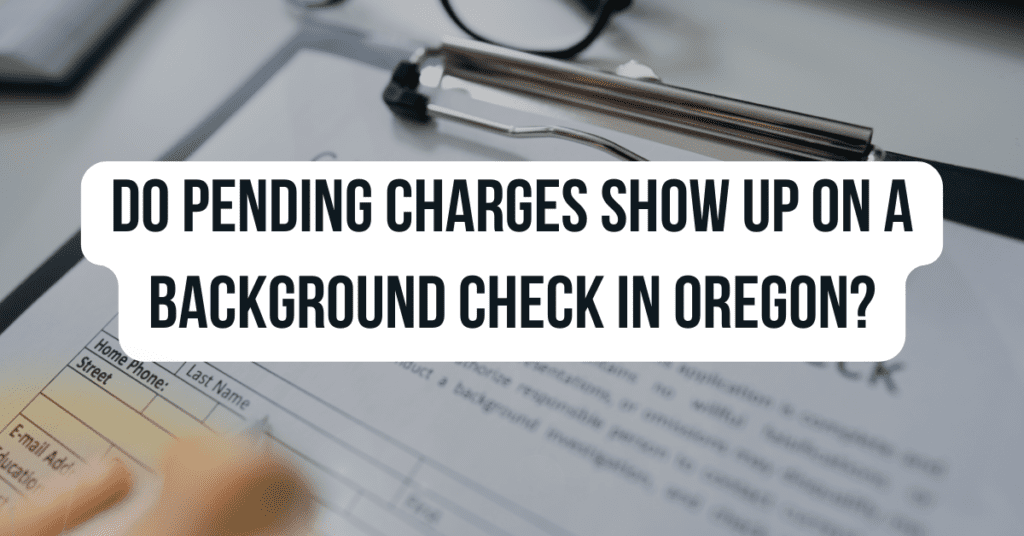
If you’ve ever been in a situation where you faced legal charges, you might wonder about the implications on your background check, especially when it comes to seeking employment. In the state of Oregon, like in many other places, background checks are a common part of the hiring process. But do pending charges show up on a background check in Oregon? Let’s delve into this topic to understand the nuances.
Understanding Pending Charges
How They Arise
Pending charges can arise from various situations, including arrests made by law enforcement, citations issued by officers, or formal charges filed by prosecutors. They represent the stage between an individual’s arrest and the resolution of their case in court, whether through dismissal, acquittal, or conviction.
Background Checks in Oregon
Purpose
The primary purpose of conducting background checks is to mitigate risks associated with hiring or engaging individuals with questionable backgrounds. Employers aim to ensure a safe and secure work environment while maintaining the integrity of their organization.
Scope
In Oregon, background checks may include various types of information, such as criminal records, driving history, credit history, and professional licenses. However, the extent of the background check often depends on the nature of the position and applicable laws and regulations.
Do Pending Charges Show Up on a Background Check in Oregon?
The inclusion of pending charges in a background check in Oregon can be a complex issue influenced by legal considerations, employer policies, and public access to records.
Legal Considerations
Under Oregon law, pending charges are considered part of an individual’s criminal history and may appear on a background check. However, certain restrictions apply to the dissemination of this information, particularly regarding privacy rights and fair employment practices.
Employer Policies
While Oregon employers have the right to conduct background checks, they must adhere to state and federal laws governing the use of criminal records in hiring decisions. Some employers may choose not to consider pending charges that have not resulted in convictions, focusing instead on convictions or relevant factors related to job performance and suitability.
Public Access to Records
In Oregon, members of the public can access certain criminal records through the Oregon State Police or county court systems. However, the information available to the public may vary depending on the jurisdiction and the nature of the charges.
Impact on Employment
Pending charges can have significant implications for individuals seeking employment, as they may affect job applications and hiring decisions.
Job Applications
When completing job applications, individuals may be required to disclose pending charges or arrests, depending on the employer’s policies and the nature of the position. Failure to provide accurate information could result in adverse consequences, including termination if discovered later.
Hiring Decisions
Employers often consider pending charges as part of the overall assessment of an applicant’s suitability for a position. While pending charges alone may not disqualify an individual from employment, employers may factor in the nature of the charges, the relevance to the job, and any mitigating circumstances.
Options for Addressing Pending Charges
Individuals facing pending charges in Oregon have options for addressing their legal situation and minimizing the impact on their employment prospects.
Legal Process
Navigating the legal process is essential for individuals facing pending charges. This may involve hiring legal representation, attending court hearings, and exploring options for resolving the case, such as plea bargains or diversion programs.
Expungement
Conclusion
Navigating the complexities of pending charges and background checks in Oregon requires understanding legal rights, employer policies, and available options for addressing legal issues. While pending charges may appear on background checks, individuals can take proactive steps to address their situation and mitigate the impact on their employment prospects.
FAQs
Are pending charges the same as convictions?
No, pending charges refer to accusations that have not yet been resolved in court, while convictions involve findings of guilt or liability.
How long do pending charges stay on record?
The duration for which pending charges remain on record varies depending on the jurisdiction and the outcome of the case.
Can pending charges affect my ability to get a job?
Yes, pending charges can influence hiring decisions, but the extent of their impact depends on factors such as the nature of the charges and the employer’s policies.
Can I expunge pending charges from my record?
Expungement eligibility for pending charges depends on factors such as the outcome of the case and the individual’s criminal history.
What should I do if my pending charges show up on a background check?
If pending charges appear on a background check, individuals should be prepared to provide context and accurate information to potential employers. They may also seek legal advice on addressing any inaccuracies or mitigating the impact.

